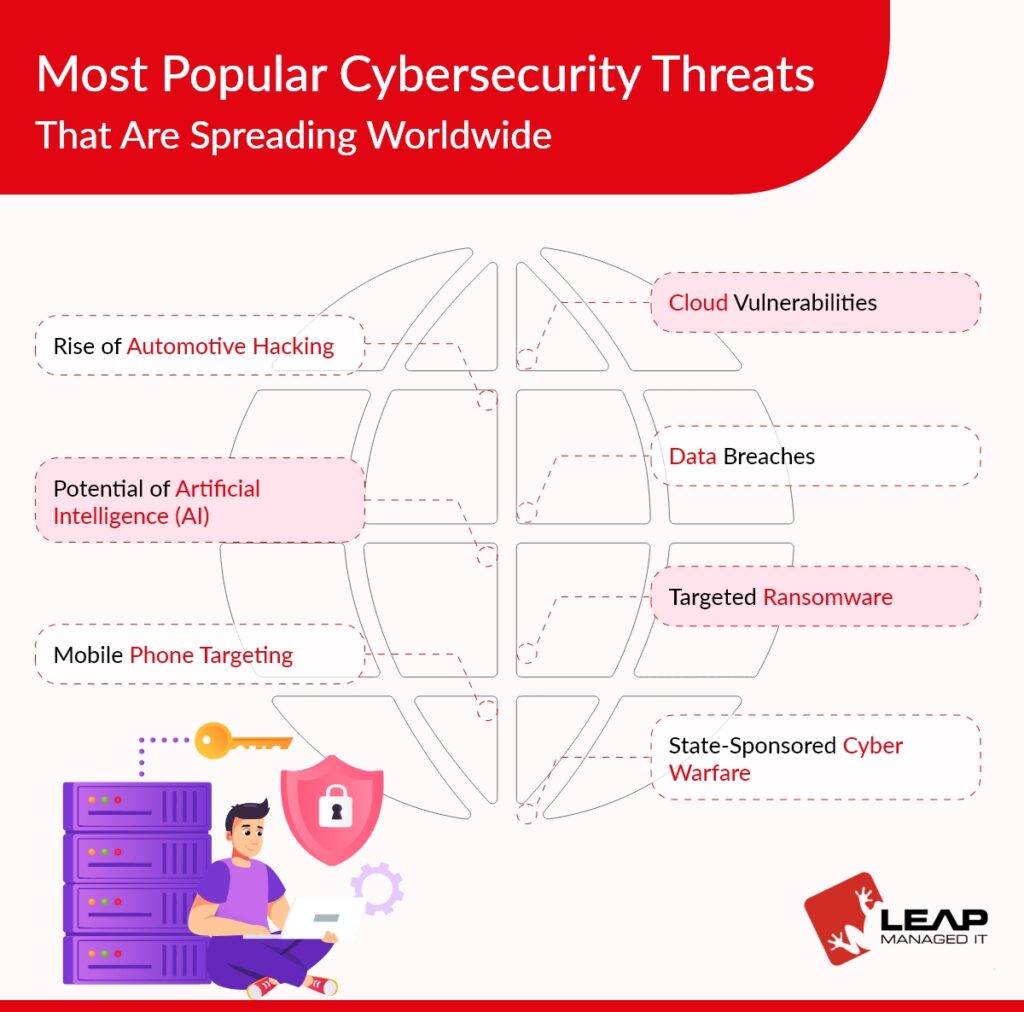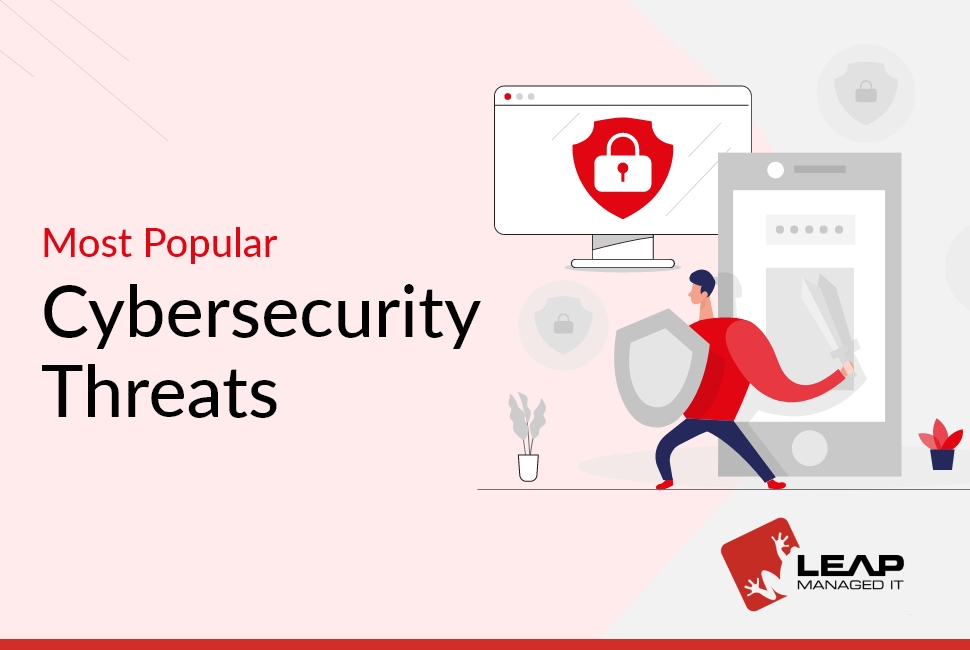“See Yourself in Cyber” This is the Cybersecurity Awareness theme for this year. As we all know, October is Cybersecurity Awareness month, with the intention to help individuals to protect themselves online from cybersecurity threats.
With this in mind, we experts at LEAP are creating cybersecurity awareness by sharing information about the most popular cybersecurity threats that are spreading worldwide due to the growing technology.
Most Popular Cybersecurity Threats That Are Spreading Worldwide
You might be aware of common cybersecurity attacks like phishing, ransomware, malware, and more. The list below can be considered as another level of security threats that can happen to any business if proper security practices are not followed,

1. Rise of Automotive Hacking
You are aware of the hacking of computers, phones, and personal data or about the leakage of information. What many people are not aware of is, cars are getting hacked. Yes, you read it right. The rise of technology has created a world full of possibilities, where you have the option to choose from a basic model car to one that has cut-edge technology implemented into it. The car is loaded with a variety of software that makes it work. Additionally, these software programs can take control of your car as well as its infotainment system.
The computers communicate using different networks and messaging protocols to connect the engine and control brakes. The touch screen system, integration of your phone to the car for wireless communication, and more. All these sounds to be hi-tech but, did you ever think that these amenities are making your car vulnerable to cyber attacks?
The more the cars are computerized, the more they are open to hackers. Hackers can easily take control of the ECU of your car and gain access to all the information and can even get control of the movement of the car. The possibility of security vulnerabilities occurs when you are connected to the internet.
2. Potential of Artificial Intelligence (AI)
AI can be suitable for any business strategy. Before starting with artificial intelligence, get to understand its workflow, data collection, and analysis that gets into it. By understanding the methodology behind AI, you can determine how it can be implemented in your industry.
Below are a few examples of how AI can be configured in business,
Chatbot – Chatbots can help businesses to improve their customer service. They can streamline the customer service process by answering the customers’ queries. Chatbots can even handle situations in a more personalized manner and importantly, they are available round the clock.
Product Recommendations – eCommerce businesses can use AI for product recommendations and keep their customers engaged. By understanding customers and recommending products based on their interests and behavior is a very efficient strategy when it comes to an eCommerce space.
Audience Segmentation – AI can be used to segment audiences and send targeted campaigns based on their interests. AIs can also be used for predicting how the users would respond to every campaign.
Identifying Fraud – Using machine learning algorithms, businesses can detect and respond to threats. In the financial industry, tools are used for identifying suspicious transactions. If detecting any risk, the transaction is stopped and an alert is sent to the respective users.
3. Mobile Phone Targeting
With the rise in the usage of mobile phones all around the world, more opportunities are created for hackers to target them and steal private information. Mobile phones are a popular target among cybercriminals as they can be accessed in several ways. People frequently keep downloading applications and software for free, which seems not to be safe and reliable. In addition to this, the majority of people will have applications running in the background without realizing it, and this is one of the entry points for hackers.
It is an advantage for hackers as the usage of emails through mobile phones keeps on increasing, and they use phishing and spam attacks to access mobile phone data. Data leakage on mobile phones occurs when necessary security measures are not implemented. This leads to the exposure of the user’s personal data.
To avoid this, you must allow permissions only when there is an absolute necessity in the application. For example, if you have downloaded an application, it asks for permission to access your camera but, you don’t intend to use it for creating videos then, do not provide the access. If the mobile phone users are granting access for all the requested permissions then, there occurs data leakage as it’s an entry point for the hackers.
4. Cloud Vulnerabilities
Cloud computing has several advantages — it is affordable, and its features make the data available, aiding productivity when compared to the traditional data center. Though most businesses are shifting to cloud services, data security is the key point that needs to be considered. The rise in the usage of cloud services is also increasing its chances of getting vulnerable to cyber attacks. Some popular cloud vulnerabilities are,
- Cloud Misconfiguration – This occurs when an organization fails to set cloud storage correctly. Unsecure identity management, public data storage, and lack of good security practices are considered to be misconfigurations in cloud computing.
- Insecure APIs – APIs are required and are made public for businesses. The APIs are implemented without sufficient authentication and authorization, as anybody with the internet can access them. As a result, they become a target for hackers.
- Lack of Visibility – When businesses use various instances of cloud services, losing of data might be simple. Visibility to see cloud infrastructure is a serious problem that can delay responding to threats and lead to a data breach.
- Lack of MFA – Multi-factor authentication is always an extra layer of security for your business. When businesses fail to implement this, it is creating an opportunity for hackers to access your data easily.
- Malicious Insiders – Though you have implemented necessary security measures, malicious insiders like your employees, contractors, or business partners can still be harmful.
5. Data Breaches
Losing information from a system, without authorization is a data breach. Businesses of any level, small or large, or an individual can become a victim of a data breach. The stolen data may involve confidential and sensitive data, such as customer details, credit card details, trade secrets, or even data on national security. Malicious methods like phishing, brute force attack, and malware for breaching the data.
Common methods of a data breach include,
- A malicious insider
- Payment card fraud
- Stolen or lost portable devices
- Unintended disclosure
- Unknown
6. Targeted Ransomware
Encrypting the vital data of an individual or an organization, which makes it impossible to access their data. Access will be given on demanding a ransom. In the quest for larger payments, hackers are now starting with targeted ransomware. Here, the hackers apply specific strategies and approaches to target companies, depending on their capacity to pay the ransom. This is termed big game hunting.
The hackers make a thorough analysis of the victim’s weaknesses, and strengths using innovative and considerable efforts. They also chose to encrypt the most valuable data and hold it for ransom. Also, they use privileges to bypass detection and security measures before installing the malware into the business.
Sectors of ransomware are,
- Education
- Retail
- Information Technology
- Financial Services
7. State-Sponsored Cyber Warfare
States can hire hackers directly by using their militaries and other government agencies and also fund them indirectly. This makes it simpler to disprove the state’s involvement in the discovery of the attack, reducing the diplomatic effects that these attacks may have.
Additionally, it blurs the difference between government and criminal organizations. The state-sponsored organizations then focus on their funders’ enemies for a variety of reasons.
State-sponsored cyber attacks involve,
- Discovering political secrets, corporate secrets, and technologies
- Attacking critical companies and their infrastructure
- Spreading disinformation
- Simply to check the capability of the attacker
Keep Your Business Secure Today
Though the digital world brings more advancement, the chances of becoming a victim of cyber attacks are also increasing. Hence, you can never keep your data private if you are not following the necessary security measures. If you were not serious about your business’s security, then, it’s time for it. Ensure you maintain good security practices within your organization and among your workforce.
Though security for data cannot be guaranteed in this digital world, getting partnered with a reputed managed service provider can help in securing the network from cyber threats. Either, a managed service provider can help the system before any vulnerabilities occur or can help in retrieving the lost data .
Are you looking for expert guidance in cybersecurity? Services at Leap begin with an IT Master Plan. Our expert team at Leap Managed IT can help in identifying the obstacles and create strategies by understanding the pain points.
Want to learn more about having a sustainable approach to IT? Speak with our Ridiculously Helpful team to learn how we can create a comprehensive roadmap for your technology. Helping Clients in Indianapolis, Carmel, Zionsville, and Greenwood.
Watch Video to learn more about our IT Master Plan.


